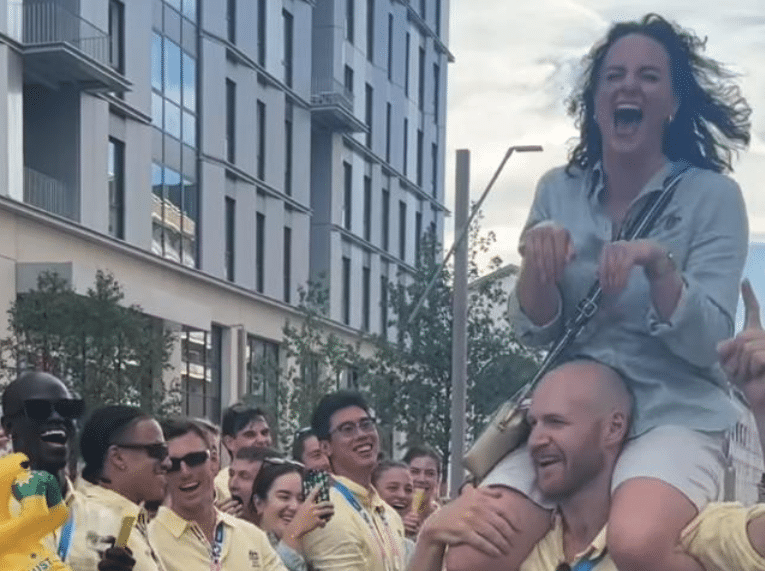The Olympic Committee wanted to create more conversations and invigorate the games by introducing “Breaking” for the Paris Games, and they were certainly successful in doing so, largely thanks to Rachael ‘Raygun’ Gunn.
The Australian Olympic Committee was also happy to comply with the IOC’s wishes, sending Raygun to the games following a selection process that included Gunn winning the top prize at an Oceania championship event.
Raygun was also willing to do her part. She took to the pool matches in Paris with gusto, proudly wearing her team colours and taking on competitors, all the while knowing—and being upfront prior—that she would struggle with some of the more athletic moves and would, therefore, rely on trying to pick up points for creativity.
Raygun didn’t pick up any points.
She did, however, hit international stardom for what many might consider would be the worst possible reasons. A performance that has received millions of views, been mocked endlessly, has been turned into various memes and created endless discussion in the homes of Australians over the weekend.
She leaves the games having provided one of the most memorable moments and becoming one of the few Australian athletes to gain name recognition internationally.
Isn’t that a win, according to IOC’s own reasons for introducing breaking in the first place?
And isn’t it a win in providing a bit of a lighter, amusing moment during the games? It brought people together over a shared conversation regarding a woman who was having a go in what many would consider a bizarre choice of sports for the Olympic Games.
But over the past few days, Raygun has copped levels of unimaginable hate and trolling, including a pile on from Australians that she was an “embarrassment”, and even demanding she atones for the poor performance are unfair.
There are numerous examples of Australians competing in the games, often in sports the majority of us also know nothing about, with little chance of making the finals or getting anywhere close to the podium.
Raygun gave us something to talk about and, unintentionally, something to share a laugh about. She provided a light, warm moment on social media at a time when there’s very little to feel warm about.
Raygun didn’t deserve the headline ‘embarrassing’ label, and she especially didn’t need the endless attacks about her age – she’s 36 – nor being labelled as a “mum” on account of her appearance, age and performance (there are plenty of mothers competing at these Olympics, and plenty of women well into their thirties, forties and older). She certainly doesn’t deserve the endless stream of hateful comments being shared across social media, including on her own Instagram account, that are misogynistic and just plain mean.
Raygun went to the Olympics, competing in a sport that much of the world is still getting its head around, and she did it her own way. She’s seriously passionate about breaking, as a cultural studies lecturer at Macquarie University and having completed a PhD on the subject. In the lead-up to the Olympics, she wrote detailed explainers on what the sport is all about—potentially doing more, academically, for a sport than any other athlete competing in Paris.
How many of the online haters have competed in the Olympics or anywhere close to a national stage? How many have ever even tried to do something courageous in public, taking on televised international scrutiny? How many people have dedicated their careers to one key sport or activity, as Raygun has?
Australia’s chef de mission Anna Meares has defended Raygun, saying that she loves and appreciates Raygun’s work and that “what has occurred on social media with trolls and keyboard warriors and taking those comments and giving them air time has been really disappointing,”
She also shared the story of Raygun’s rise in a male-dominated sport, including being looked at in a room in 2008 in tears as “the only woman” competing and having to put in great courage to continue and fight for the opportunity to participate in the sport she loved.
Meares also noted the history of female athletes facing criticism and judgement and the fact that 100 years ago, Australia sent a team of 37 men to the 1924 Paris Olympics and no women.
“One hundred years later, we have 256 women represented here. And Raygun is an absolutely loved member of this Olympic team.
“She [Raygun] has represented the Olympic team, the Olympic spirit with great enthusiasm, and I absolutely love her courage. I love her character, and I feel very disappointed for her that she has come under the attack that she has.”
The Prime Mininster, meanwhile, has thanked Raygun for “having a crack”.
Breaking won’t be appearing at the 2028 Olympics in LA. But it could be making a comeback for Brisbane in 2032.
Given the many armchair critics “apologising” to the world on behalf of Australia and making claims to whether someone can or can’t take a shot after rightfully qualifying, we’re surely now well prepared to start developing some serious talent to make a huge mark on breaking at those games.
In the meantime, Raygun pulled out some moves on the streets of Paris early this morning in line with the closing ceremony, celebrating with the Australian team. She drew in a huge crowd cheering her on. You won’t see hate and anger in the crowd looking on, rather you’ll see joy and people coming together. That’s a win, Raygun. Congratulations.
Pictured above: Raygun on the shoulders of rower Angus Widdicombe during the Closing Ceremony celebrations in Paris.

